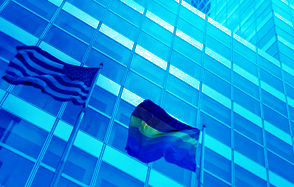


Doug Marshall (IAFR) shares about the situation of refugees in Malta. “I would challenge the political right [in Europe] to be a little bit more engaging. Especially if they claim to be Christian right.”

How is Malta a prototype of what could happen in the future in other European countries? How should we respond to far-right movements which offer 'easy solutions' to the crisis? Doug Marshall (IAFR) works with refugees in the Mediterranean island.

“Pray for the groups of various ethnic backgrounds among whom once more the seed of distrust has been sown today. Pray for peace in the midst of divisive forces”, General Secretary Thomas Bucher writes.

EEA encourages European evangelical community to pray for Turkish Christians reaching out to hungry refugees.

“This is the closest language to mean ‘genocide’ without using that terminology”, says EEA representative in Brussels Christel Lamère Ngnambi.

A 2012 UNHCR document by António Guterres already highlighted the central role faith-based organisations play in “making solutions sustainable by helping refugees integrate in their new communities.”

Under the umbrella of the Evangelical Alliance, Christians in Hungary have formed a coalition “to give a real Christian response.”

The Czech Evangelical Alliance prepared a guide focused on the “The return of the lost sons.” Hundreds of churches will gather in daily meetings across the world for this initiative started in 1847.

Child trafficking, forced labour, domestic servitude and trafficking for sexual exploitation, are real problems today. Many events all around Europe have tried to raise awareness about it.

Representatives meeting in Germany exhorted churches in all European countries to “not confuse our own cultural identity with theological essentials.”

Students and graduates interested in politics were invited to the first Youth European Prayer Breakfast held in Brussels. “We cannot leave our faith at the door when going into politics.”

The World Evangelical Alliance starts a task force to “strengthen the collaboration between various Evangelical Alliances, agencies and churches serving the needs of refugees.”

More than 30 evangelical organisations and “countless churches” engaged in welcoming “forced migrants in need of refuge”. European Evangelical Alliance calls believers to “follow in Jesus’ way of sacrificial charity”.

Some family values organisations alerted about next week’s EU Parliament voting. EEA’s Christel Lamère comments on the background of the text.

Marc Jost (SEA), Thomas Bucher (EEA) and Clément Diedrichs (CNEF) share their opinions. Accepting democratic majorities does not mean to renounce to freedom of speech.

The Comission introduces a country-by-country quota system to respond to the Mediterranean crisis. Evangelicals had asked for real solutions in recent weeks.

European Freedom Network gathered its partners for the third time to engage in collaborative dialogue on effective strategies in the fight against human trafficking at the Bridge Conference in Bucharest, Romania.

EEA’s secretary general Thomas Bucher thinks “evangelicals have to influence society on all different levels.”

Influence in society, evangelical identity and projects in Europe. An interview with Thomas Bucher, secretary general of the European Evangelical Alliance.

Thomas Bucher, secretary general of the European Evangelical Alliance, “expected more respect towards victims who were not from a Catholic background.”

Christel Lamère, representative of the European Evangelical Alliance in Brussels, asks for “binding agreements and tangible objectives.”

Council of Europe will vote a resolution asking European governments to “tackle intolerance in Europe with a special focus on Christians”. Evangelicals hope this will protect faith communities in countries in which they are marginalized.

Las opiniones vertidas por nuestros colaboradores se realizan a nivel personal, pudiendo coincidir o no con la postura de la dirección de Protestante Digital.